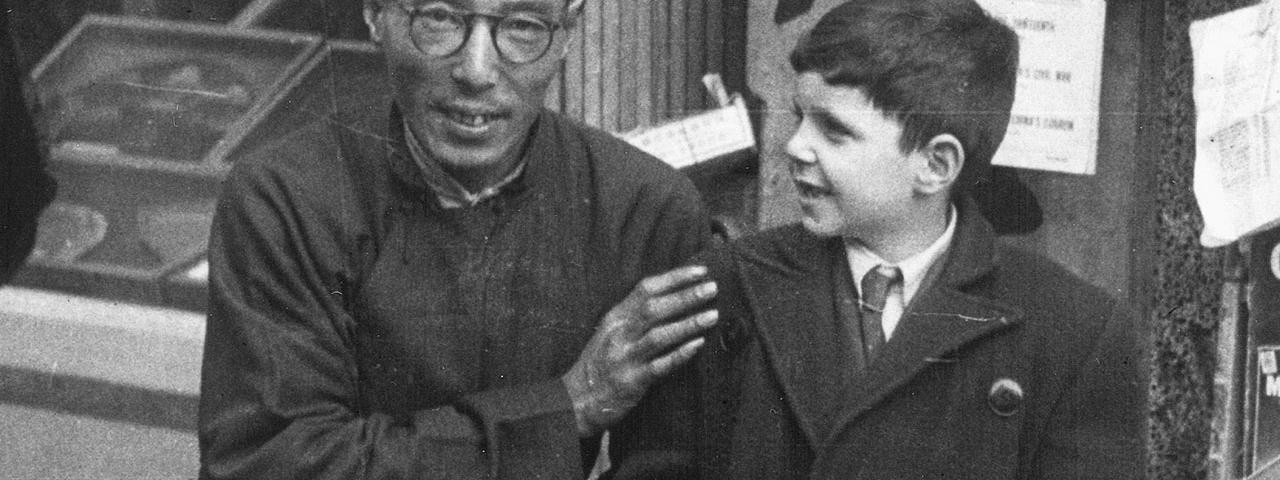
René Balcer, writer-director of documentary Above the Drowning Sea, tells how the story of the escape of Jews from Nazi-controlled Europe to Shanghai on the eve of WWII, is an echo of history with parallels in today’s world.
Shot across six countries, the documentary follows the personal journeys of Jewish refugees who came to Shanghai, and of the city’s Chinese residents who helped them survive in China, forming lasting friendships that have survived to this day.
Q: What compelled you to tell this story?
It’s a story that I’ve known for a while because my wife is from Shanghai, and she learned it from her parents. When the opportunity came to make a film about this, it also coincidentally reflected what was happening in present day with the Syrian refugee crisis. I wanted to see how history dealt with these similar events—that was basically the impetus for it. History may not repeat itself, but it rhymes, and here it was rhyming again.
Shanghai newspaper vendor with young Jewish refugee
Q: What parallels do you see with today’s refugee crisis?
Back in 1937 and 1938, the Jews were being persecuted in Germany and Austria. No country wanted them. Franklin Roosevelt gave many speeches where he said: ‘Well, among these refugees are German spies.’ Canada said ‘none is too many.’ A lot of it was racist, a lot of it was xenophobic and isolationist. Strangely enough, it mirrors similar reasons people have for refusing Muslim refugees now. What we're trying to do with this film is not only show people what they are but what they could be. At the end of the film, we feature a bit about what happens to each of these refugees—most of them being Jewish refugees, one is a Chinese refugee—and we find out what contributions they’ve made to the societies they’ve ended up in.
Open air kitchen in Shanghai
Q: What was life like for the Jewish refugees who came to Shanghai?
They lived mostly in the Hongkou district in the late 30s, which was already a poor district filled with internal refugees. The Jewish refugees had been stripped of everything by the Nazis by the time they left Europe. When you have two groups of poor people thrown in together, who don’t necessarily have a common language or culture, and with limited resources, you might expect the worst scenario, but here you didn’t have that. People got along, made accommodations, helped one another.
The crew on a street corner in Hongkou
Q: Why do you think this was?
I think partly it has to do with the Chinese character, with the background of Confucianism, where the philosophy is that all people are basically the same. What elevates you is your education, your exercise of filial duty. The people in Hongkou, on an individual basis, helped the refugees and gave them a place to stay.
Zhou Huizhen with a photo of her father
Q: What is new or different in your film’s portrayal of this story?
There’s been a couple of films made about this subject, but usually only taking the point of view of the Jewish refugees. We wanted to also talk to the Chinese who were there. Because almost everyone in the film were either children or young teenagers at the time, there is also this point of view of childhood and adolescence, and how they went through the war.
We’re not trying to be encyclopedic about everything. We don’t cover the fact that there was a Jewish orchestra, a Jewish newspaper—that had nothing to do with the experiences of these children. The film will make you wonder what kinds of memories the refugee children from the Middle East will have in the future.
René Balcer moments before the NYU Shanghai screening of Above the Drowning Sea
Q: What do you want your audience to walk away knowing/feeling?
Other than learning the history, I hope people will feel less powerless when faced with global issues, whether it’s refugees or poverty alleviation. Just to know that you on your own, or with friends or like-minded people can do something and actually have an impact on people.
--
This special film screening at NYU Shanghai was sponsored by the C. V. Starr East Asian Library, Columbia University.
Many thanks to: René Balcer and co-executive producer Carolyn Hsu, and Dr Ezra Claverie, Language Lecturer in the Writing Program at NYU Shanghai.
Interview by Charlotte San Juan.

